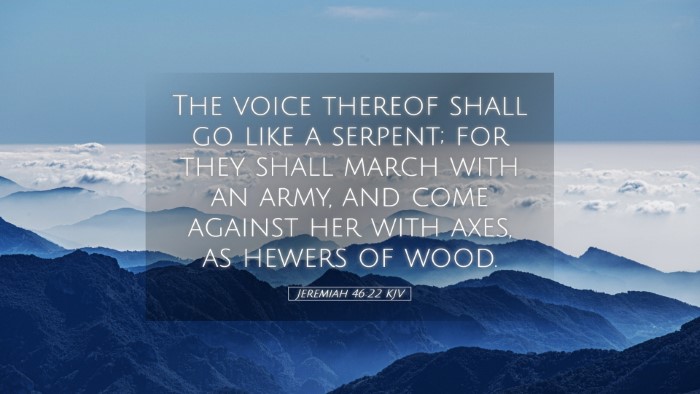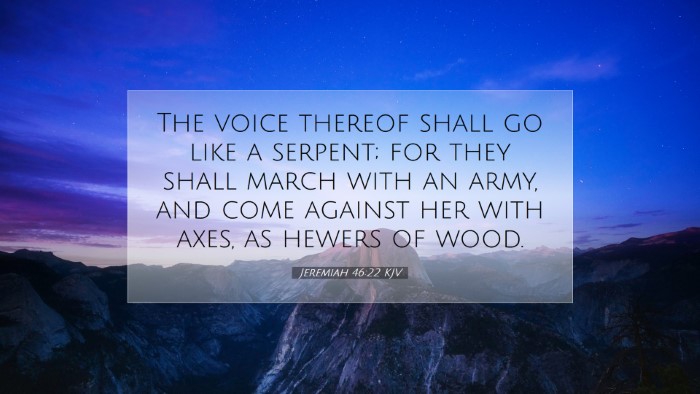Commentary on Jeremiah 46:22
Verse: "The voice thereof shall go like a serpent; for they shall march with an army, and come against her with axes, as hewers of wood."
Introduction
The verse Jeremiah 46:22 is set within a larger context of prophecy against the nations, specifically focusing on Egypt's downfall and defeat by Babylon. This passage serves both as a warning and a lesson to those engaged in idolatry and false security. The imagery presented is vivid and compelling, revealing the urgency and seriousness of God’s judgment upon nations that oppose His will.
Exegesis
In this verse, the term "voice" emphasizes the sound of an advancing army that is likened to a serpent, which evokes an image of stealth and danger. This metaphor implies that the impending invasion will strike with sudden and severe impact, much like the bite of a serpent.
Key Themes
- Judgment: The military advancement against Egypt illustrates God's judgment upon nations that turn from Him.
- Metaphor of the Serpent: The serpent symbolizes both danger and the deceptive nature of the enemies, likening their strategy to that of a cunning predator.
- Military Might: The mention of axes and woodcutters signifies the overwhelming force that will level Egypt’s defenses, showing the thoroughness of their defeat.
Commentary Insights
Matthew Henry's Commentary
Matthew Henry observes that the comparison to a serpent illustrates the destructive and malicious intent of the Babylonian army. Just as a serpent goes unnoticed until it strikes, so too will Babylon’s approach bring total devastation to Egypt. Henry emphasizes the inevitable nature of judgment for nations that have forsaken God, highlighting how no earthly power can withstand divine authority.
Albert Barnes' Notes on the Bible
Albert Barnes interprets the "voice" of the serpent as an auditory cue of the impending warfare, which adds to the ominous foreboding of the moment. He elaborates on the use of "axes" as representative of the totality of destruction. Barnes stresses that God is sovereign over nations and uses tools such as armies to execute His judgment, portraying a God who is actively involved in worldly affairs.
Adam Clarke's Commentary
Adam Clarke delves into the allusion to "hewers of wood" which symbolizes severe punishment and laborious defeat for Egypt. Clarke notes the irony in Egypt's reliance on military maneuvers, stating that it will be their own armies which lead to their downfall. His commentary reinforces the message of divine retribution against those who consider themselves invincible due to their grandeur.
Theological Implications
This verse has profound implications for understanding God's character, particularly His justice and holiness. The judgment against Egypt is indicative of a God who is righteous and who does not overlook wrongdoing, whether in nations or individuals. It serves as a critical reminder for believers today regarding the importance of relying on God's strength rather than our resources.
Lessons for Pastoral Application
- Trust in Divine Sovereignty: Pastors are encouraged to remind their congregations of God's ultimate authority over worldly powers, reinforcing that judgment is certain for those who oppose His ways.
- Call to Repentance: This passage can serve as a clarion call for nations and individuals to repent from their sins and seek God’s mercy rather than continuing down a path of pride and idolatry.
- Encouraging Discernment: Just as the serpent's advance is subtle, believers today must remain vigilant against deception in their lives, fostering a heightened awareness of spiritual warfare.
Conclusion
Jeremiah 46:22 stands as a remarkable reminder of God's active role in history and His deliverance of judgment upon those who turn away from Him. The rich imagery and powerful warnings found within this verse are essential for students of theology, scholars, and pastors alike, encouraging a deep reflection on the nature of divine justice and the call for faithful allegiance to God.


